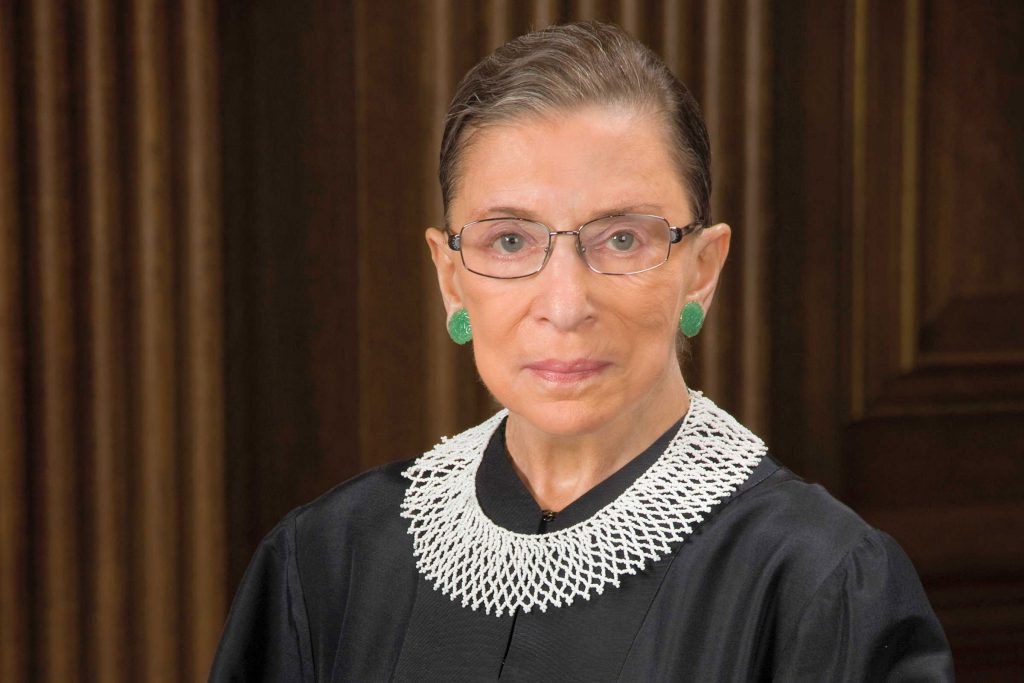The exemplary life and tragic passing of Supreme Court Justice Ruth Bader Ginsburg was the topic of a BC Law American Constitution Society gathering Sept. 21 at which students and faculty, some of whom knew her personally, paid tribute and shared thoughts on her character, intellect, and tireless fight toward equality and justice.
Professors Kent Greenfield, Robert Bloom, Mark Brodin, Kari Hong, Steven Koh, and visiting Drinan Scholar Nathaniel Romano, SJ, formed the panel moderated by ACS Vice President Zoe Atchinson ’21.
Professor Greenfield clerked for Justice David Souter from 1994 to 1995, which was also Justice Ginsburg’s second year on the bench. He recalled the SCOTUS tradition in which the set of clerks for one justice, as a group, takes each of the other justices out to lunch. Justice Ginsburg, a notoriously hard worker, instead invited each set of clerks to her chambers for tea. Her chambers were on the second floor of the court, painted all white, filled with modern art and flowers, and it was bright and airy. “Walking into her chambers was like walking into sunlight,” Greenfield said.
“Ruth Ginsburg was one of the members of the Court who achieved greatness before she became a great justice,” Greenberg said quoting Justice Souter, then added a footnote of his own: “Many of her greatest judicial victories came by way of dissent.”
At another point in the panel discussion, Professor Brodin also remarked on Ginsburg’s powerful dissents, in particular in Ledbetter v. Goodyear Tire & Rubber Co., which eventually led Congress to write the Lilly Ledbetter Fair Pay Act of 2009. The law bolstered worker protections against pay discrimination.
Brodin also shared a personal story about Justice Ginsburg. In the spring of his final year at Columbia Law, he served as a research assistant to then-professor Ginsburg, who would be moving from Rutgers to Columbia the following fall. Brodin was helping her with the textbook she was writing on sex discrimination. Their routine, which he humorously dubbed “pulling a Clark Kent,” was for him to call her from a phone booth in the Columbia law school lobby to discuss assignments.
Professor Bloom viewed as auspicious the date of Justice Ginsburg’s passing, Friday, September 18, which was the start of Rosh HaShanah, the Jewish New Year. It is said in Jewish tradition that one who dies on the start of the new year is a tzadik, a person of great righteousness. He explained that a tzadik isn’t a person who is especially pious or devoted to attending services, but rather someone who fights for justice. “Justice Ginsburg fought for justice her whole life,” Bloom said.
Hong expressed admiration for the diplomacy of Justice Ginsburg, who recognized the importance of being both an ally and an advocate. She had a beautiful way of modeling agreeable disagreement, Hong said, referencing the Justice’s famous friendship with the late Justice Antonin Scalia. Hong also issued one of Justice Ginsburg’s most influential quotes as a commandment to law students: “Fight for the things that you care about, but do it in a way that will lead others to join you.”
When Professor Koh worked with the American Society for International Law, Justice Ginsburg was its chair. Smiling, he recalled that she, small and seemingly frail, would sit, quiet and unassuming, then dazzle everyone in conversation with questions that were incredibly sharp and precise.
He encouraged students to take Justice Ginsburg’s life as proof that you can translate your lived experience into your legal practice, philosophy, and principles. After all, Koh said, she experienced hardships in life, being a woman, a Jew, a mother, a cancer survivor, and a wife to a cancer survivor, and all of those experiences shaped her career into what it became.
One of the greatest things Justice Ginsburg did for our country, said Fr. Romano, was to say tirelessly that “everybody needs to be here.” Such was her fight for equal representation and her powerful dissent in Shelby County v. Holder, which gutted the Voting Rights Act.
During the event, some students said that having Justice Ginsburg on the courts for their whole lives was like having a guidepost to model what could be achieved. Another acknowledged that many of her own opportunities in life are the result of the litigation Justice Ginsburg pushed through for women’s rights.


